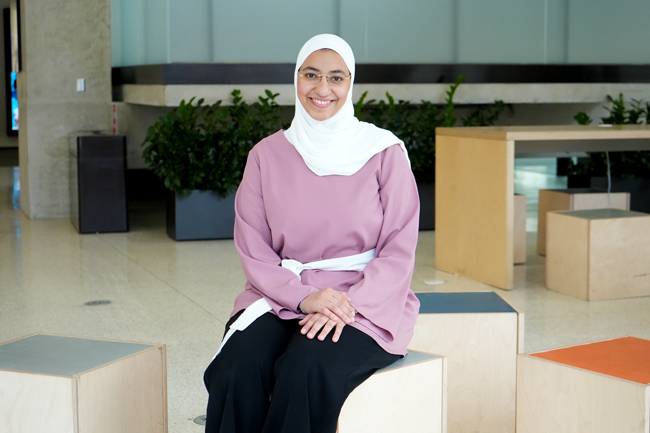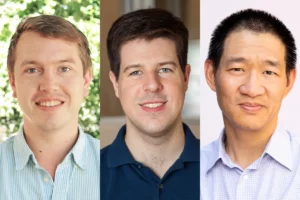
JANUARY 9, 2023 • By Matthew Tierney
In January, Professor Salma Emara joined The Edward S. Rogers Sr. Department of Electrical & Computer Engineering (ECE).
Emara received her PhD in Electrical and Computer Engineering from U of T in 2022, during which she won two departmental teaching awards for first- and second-year programming courses.
“Professor Emara has proven herself an accomplished and popular teacher,” says Professor Deepa Kundur, Chair of ECE. “She is dedicated to engaging her students with a hands-on, inclusive approach to programming, and she’s always alert to new pedagogical practices. I’m thrilled that she’s now a member of ECE faculty.”
ECE’s Matthew Tierney connected with Professor Emara to learn about her teaching philosophy, what it is about ECE students that she admires, and how to discover your passion (hint: it might not come easy).
Explain your approach to teaching.
Engineering is about problem-solving by applying science, and in my teaching I use a hands-on approach. I start by articulating the problem at hand, provide motivation by explaining why it is worth solving, and logically introduce each step towards a potential solution. I engage students by developing incomplete iterations of the solution, allowing them to explore promising paths and asking them questions to guide them to the right one.
It’s better for the student to be able to identify their mistake than for me to point it out, though I will introduce a solution if someone’s stuck.
When did you know engineering was for you?
Many engineers say they loved to build things when they were kids. I broke things. I wanted to know how things worked, and when I tried to figure it out, they broke. I rarely fixed them!
There was no exact moment when I knew engineering was for me. It came on gradually. I went on to study engineering because I enjoyed the applied part of physics in high school, where I finally I got the chance to fix the things I’d break.
But I had the most fun explaining science to my classmates.
What excites you about ECE?
What excites me most are the professors and students. Having studied here for my PhD, I got a chance to see up close other ECE professors, in particular my supervisor Professor Baochun Li, whose teaching style is one I took a lot from. I’d say overall their teaching excellence is unmatched. They teach students how to think and how to learn, skill sets that are transferable to many domains in life beyond engineering.
And the students at ECE are inspiring and enthusiastic. I was here throughout the pandemic and observed firsthand their resilience and maturity. For example, one time a student of mine was complaining about the labs in a course, which were becoming challenging — but he made it clear that he wanted more aid, not easier labs. This growth mindset is common among students at ECE and it makes me excited to teach here.
What courses are you looking forward to teaching and why?
That would be the programming, algorithms and machine intelligence courses — especially for students experiencing these for the first time. First-time programmers face many obstacles. Programming is often not part of high-school curriculums like math and science, and first-timers don’t have ready skills to fall back on. Because of this, I’ve seen some switch to another major that requires little to no programming skills. It’s my goal to be that welcoming teacher that gets them over that initial hump.
Any advice for the students this term?
At some point we’ve all heard the advice: “Follow your passion.” But to follow it, you must first know what it is.
Since we love doing things that we are good at, we might assume that must be our passion. But some things are easier to do than others. Engineering is not simple, and it can be hard to be good at it right away. This can push people away from it. Be patient when you’re learning something new. It may take time till you develop a passion for it — that’s what the department and University are here for, to help you with that.
But don’t stop interrogating what you learn. People sometimes fall into the perception that what they know is the only right way. I’ve experienced this with myself and my students, and it can be harmful. Make sure to throw out ideas to classmates, colleagues, friends, TAs or professors, really challenge what you assume you know, discover what you do not, and clarify doubts.
What do you hope to accomplish as an educator in the next few years?
I want to make sure knowledge is easily accessible to students from different backgrounds. For example, not everyone has had experience programming before, and I want to create an inclusive learning environment for all students. I want students to feel safe to ask all their questions, if even they seem “silly” — they never are to me!
Also, while obviously knowledge can be acquired from books, there is no substitute for experience. My goal is to ensure students create things by hand, take risks and make mistakes to gain this experience. This experience will inspire them to create more things. I am particularly interested in debugging as a skill since it is transferable to many domains in life. It resonates well with the life skill of how to deal with failures, which is part of becoming a good person as well as a good engineer.
Tell us a fun fact about yourself.
I taught myself how to ride a bike at the age of 24. My friends (and YouTube) gave me tips and tricks, but the first time I actually rode a bike I was alone. It was during the pandemic on U of T campus in the area between Sidney Smith and Lash Miller. It’s never too late to start learning something new, right?


